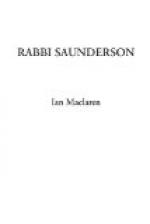“He cowes (beats) a’ ye ever saw or heard,” the farmer of Mains explained to the elders at the gate. “He gaed tae his room at half twa and wes oot in the fields by four, an’ a’m dootin’ he never saw his bed. He’s lifted abune the body a’thegither, an’ can hardly keep himsel awa frae the Hebrew at his breakfast. Ye’ll get a sermon the day, or ma name is no Peter Pitillo.” Mains also declared his conviction that the invasion of mice would be dealt with after a scriptural and satisfying fashion. The people went in full of expectation, and to this day old people recall Jeremiah Saunderson’s trial sermon with lively admiration. Experienced critics were suspicious of candidates who read lengthy chapters from both Testaments and prayed at length for the Houses of Parliament, for it was justly held that no man would take refuge in such obvious devices for filling up the time unless he was short of sermon material. One unfortunate, indeed, ruined his chances at once by a long petition for those in danger on the sea—availing himself with some eloquence of the sympathetic imagery of the one hundred and seventh Psalm—for this effort was regarded as not only the most barefaced padding, but also as evidence of an almost incredible blindness to circumstances. “Did he think Kilbogie wes a fishing-village?” Mains inquired of the elders afterwards, with pointed sarcasm. Kilbogie was not indifferent to a well-ordered prayer—although its palate was coarser in the appreciation of felicitous terms and allusions than that of Drumtochty—and would have been scandalised if the Queen had been omitted; but it was by the sermon the young man must stand or fall, and Kilbogie despised a man who postponed the ordeal.
Saunderson gave double pledges of capacity and fulness before he opened his mouth in the sermon, for he read no Scripture at all that day, and had only one prayer, which was mainly a statement of the Divine Decrees and a careful confession of the sins of Kilbogie; and then, having given out his text from the prophecy of Joel, he reverently closed the Bible and placed it on the seat behind him. His own reason for this proceeding was a desire for absolute security in enforcing his subject, and a painful remembrance of the disturbance in a south country church when he landed a Bible—with clasps—on the head of the precentor in the heat of a discourse defending the rejection of Esau. Our best and simplest actions—and Jeremiah was as simple as a babe—can be misconstrued, and the only dissentient from Saunderson’s election insisted that the Bible had been deposited on the floor, and asserted that the object of this profanity was to give the preacher a higher standing in the pulpit. This malignant reading of circumstances might have wrought mischief—for Saunderson’s gaunt figure did seem to grow in the pulpit—had it not been for the bold line of defence taken up by Mains.
“Gin he wanted tae stand high, wes it no tae preach the word? an’ gin he wanted a soond foundation for his feet, what better could he get than the twa Testaments? Answer me that.”




